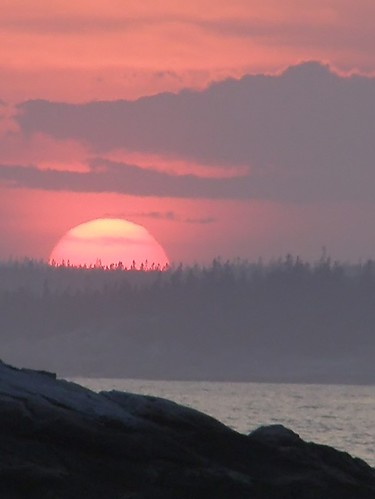 Long grow the days, and long lie the shadows. The year's second half is upon us. With fractal precision, life's second half has likewise begun. Or so I hope and fear, all at once. In words written under the pseudonym Fiona Macleod and familiar to the readers of this forum:
Long grow the days, and long lie the shadows. The year's second half is upon us. With fractal precision, life's second half has likewise begun. Or so I hope and fear, all at once. In words written under the pseudonym Fiona Macleod and familiar to the readers of this forum:
- Here in the heart of Summer, sweet is life to me still,
- But my heart is a lonely hunter that hunts on a lonely hill.
 Some two dozen weeks after I originally wrote O lost!, some of the emotional urgency has indeed dissipated. Perhaps it is merely a function of light and warmth; if so, the cycle will turn by and by, and soon enough I shall again walk among the shadows. But if perchance by the light of fireflies I have lain soft and supped in languor, may the Lord not let die in my heart the memory of loneliness and bitter cold.
Some two dozen weeks after I originally wrote O lost!, some of the emotional urgency has indeed dissipated. Perhaps it is merely a function of light and warmth; if so, the cycle will turn by and by, and soon enough I shall again walk among the shadows. But if perchance by the light of fireflies I have lain soft and supped in languor, may the Lord not let die in my heart the memory of loneliness and bitter cold.O lost!
[Originally published on Jurisdynamics, January 28, 2008]
It is the darkest hour in the deepest night of the coldest season, and through the shadows I reach for twin sources of literary inspiration linked by the most tenuous of connections. O lost!
 |  |
First I look across time and the river to a Southern writer not yet forgotten, the master behind the South's greatest autobiographical protagonist, Eugene Gant:
When will they come again? When will they come again?Thomas Wolfe, Look Homeward, Angel (1929).The laurel, the lizard, and the stone will come no more. The women weeping at the gate have gone and will not come again. And pain and pride and death will pass, and will not come again. And light and dawn will pass, and the star and the cry of a lark will pass, and will not come again. And we shall pass, and shall not come again.
What things will come again? O Spring, the cruellest and fairest of the seasons, will come again. And the strange and buried men will come again, in flower and leaf the strange and buried men will come again, for death and the dust will die. And Ben will come again, he will not die again, in flower and leaf, in wind and music far, he will come back again.
O lost, and by the wind grieved, ghost, come back again!
And thence I look forward to Lost, even though I linger still in the twilight between seasons three and four. Lost is filled with characters who articulate diverse brands of faith, with wildly variable degrees of sincerity and credibility, but none speaks more powerfully than Mr. Eko, whose path to the priesthood took him through a simultaneous baptism, confirmation, and ordination in a shower of heroin. Though Mr. Eko slew many men, the last three with a machete while wearing a clerical collar he had not yet earned, he was holy beyond contemplation, let alone expression.
 This was Mr. Eko's final confession:
This was Mr. Eko's final confession:I have nothing to confess because I have not sinned. Everything I have done, I have to done in order to survive. When I was a boy, I killed a man in order to save my brother. I am proud of what I have done. I have done the best I could with the life I was given.I have done my best. I confess nothing, except this report as true as it is heartfelt: Lost, I too walk between the twin shadows of despair and defiance.







.png)








No comments:
Post a Comment